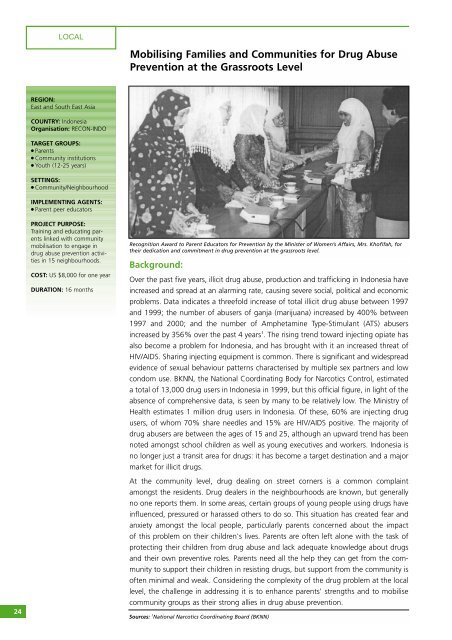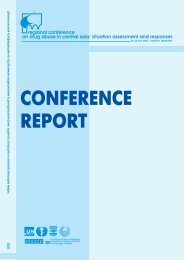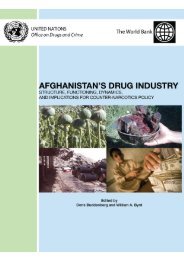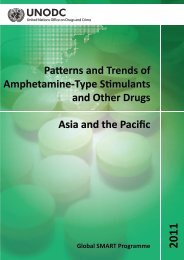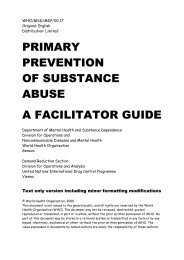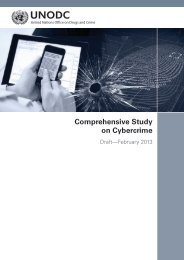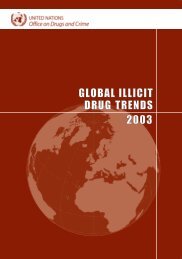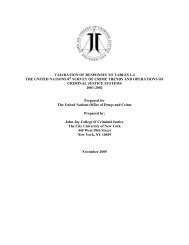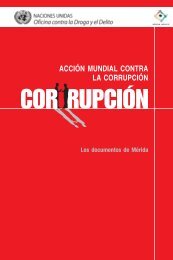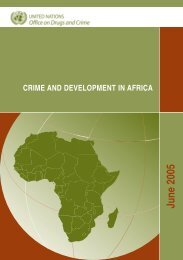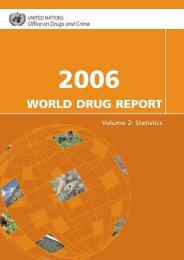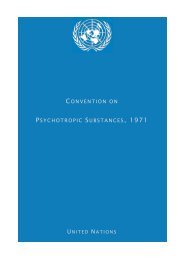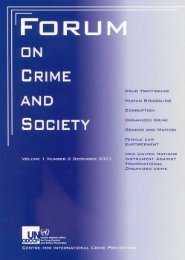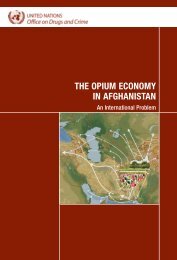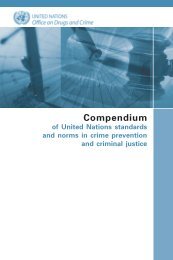PDF (Lessons learned in drug abuse prevention: a global review)
PDF (Lessons learned in drug abuse prevention: a global review)
PDF (Lessons learned in drug abuse prevention: a global review)
Create successful ePaper yourself
Turn your PDF publications into a flip-book with our unique Google optimized e-Paper software.
LOCAL<br />
Mobilis<strong>in</strong>g Families and Communities for Drug Abuse<br />
Prevention at the Grassroots Level<br />
REGION:<br />
East and South East Asia<br />
COUNTRY: Indonesia<br />
Organisation: RECON-INDO<br />
TARGET GROUPS:<br />
● Parents<br />
● Community <strong>in</strong>stitutions<br />
● Youth (12-25 years)<br />
SETTINGS:<br />
● Community/Neighbourhood<br />
IMPLEMENTING AGENTS:<br />
● Parent peer educators<br />
24<br />
PROJECT PURPOSE:<br />
Tra<strong>in</strong><strong>in</strong>g and educat<strong>in</strong>g parents<br />
l<strong>in</strong>ked with community<br />
mobilisation to engage <strong>in</strong><br />
<strong>drug</strong> <strong>abuse</strong> <strong>prevention</strong> activities<br />
<strong>in</strong> 15 neighbourhoods.<br />
COST: US $8,000 for one year<br />
DURATION: 16 months<br />
Recognition Award to Parent Educators for Prevention by the M<strong>in</strong>ister of Women’s Affairs, Mrs. Khofifah, for<br />
their dedication and commitment <strong>in</strong> <strong>drug</strong> <strong>prevention</strong> at the grassroots level.<br />
Background:<br />
Over the past five years, illicit <strong>drug</strong> <strong>abuse</strong>, production and traffick<strong>in</strong>g <strong>in</strong> Indonesia have<br />
<strong>in</strong>creased and spread at an alarm<strong>in</strong>g rate, caus<strong>in</strong>g severe social, political and economic<br />
problems. Data <strong>in</strong>dicates a threefold <strong>in</strong>crease of total illicit <strong>drug</strong> <strong>abuse</strong> between 1997<br />
and 1999; the number of <strong>abuse</strong>rs of ganja (marijuana) <strong>in</strong>creased by 400% between<br />
1997 and 2000; and the number of Amphetam<strong>in</strong>e Type-Stimulant (ATS) <strong>abuse</strong>rs<br />
<strong>in</strong>creased by 356% over the past 4 years 1 . The ris<strong>in</strong>g trend toward <strong>in</strong>ject<strong>in</strong>g opiate has<br />
also become a problem for Indonesia, and has brought with it an <strong>in</strong>creased threat of<br />
HIV/AIDS. Shar<strong>in</strong>g <strong>in</strong>ject<strong>in</strong>g equipment is common. There is significant and widespread<br />
evidence of sexual behaviour patterns characterised by multiple sex partners and low<br />
condom use. BKNN, the National Coord<strong>in</strong>at<strong>in</strong>g Body for Narcotics Control, estimated<br />
a total of 13,000 <strong>drug</strong> users <strong>in</strong> Indonesia <strong>in</strong> 1999, but this official figure, <strong>in</strong> light of the<br />
absence of comprehensive data, is seen by many to be relatively low. The M<strong>in</strong>istry of<br />
Health estimates 1 million <strong>drug</strong> users <strong>in</strong> Indonesia. Of these, 60% are <strong>in</strong>ject<strong>in</strong>g <strong>drug</strong><br />
users, of whom 70% share needles and 15% are HIV/AIDS positive. The majority of<br />
<strong>drug</strong> <strong>abuse</strong>rs are between the ages of 15 and 25, although an upward trend has been<br />
noted amongst school children as well as young executives and workers. Indonesia is<br />
no longer just a transit area for <strong>drug</strong>s: it has become a target dest<strong>in</strong>ation and a major<br />
market for illicit <strong>drug</strong>s.<br />
At the community level, <strong>drug</strong> deal<strong>in</strong>g on street corners is a common compla<strong>in</strong>t<br />
amongst the residents. Drug dealers <strong>in</strong> the neighbourhoods are known, but generally<br />
no one reports them. In some areas, certa<strong>in</strong> groups of young people us<strong>in</strong>g <strong>drug</strong>s have<br />
<strong>in</strong>fluenced, pressured or harassed others to do so. This situation has created fear and<br />
anxiety amongst the local people, particularly parents concerned about the impact<br />
of this problem on their children's lives. Parents are often left alone with the task of<br />
protect<strong>in</strong>g their children from <strong>drug</strong> <strong>abuse</strong> and lack adequate knowledge about <strong>drug</strong>s<br />
and their own preventive roles. Parents need all the help they can get from the communityto<br />
support their children <strong>in</strong> resist<strong>in</strong>g <strong>drug</strong>s, but support from the communityis<br />
often m<strong>in</strong>imal and weak. Consider<strong>in</strong>g the complexity of the <strong>drug</strong> problem at the local<br />
level, the challenge <strong>in</strong> address<strong>in</strong>g it is to enhance parents' strengths and to mobilise<br />
community groups as their strong allies <strong>in</strong> <strong>drug</strong> <strong>abuse</strong> <strong>prevention</strong>.<br />
Sources: 1 National Narcotics Coord<strong>in</strong>at<strong>in</strong>g Board (BKNN)


